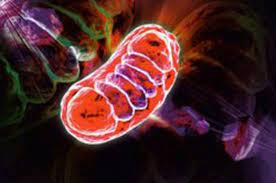Mitochondrial Diseases : Recent Study

A recent study has revealed that about a quarter of mitochondrial disease patients suffer from malnutrition.
- Mitochondrial diseases are a group of conditions that affect how mitochondria work in your body.
- Mitochondria are membrane-bound cell organelles that generate most of the chemical energy needed to power the cell’s biochemical reactions.
- They make it by combining oxygen with the fuel molecules (sugars and fats) that come from your food.
- Chemical energy produced by the mitochondria is stored in a small molecule called adenosine triphosphate (ATP).
- Generally, mitochondria, and therefore mitochondrial DNA, are inherited only from the mother.
- When the mitochondria are defective, the cells do not have enough energy. The unused oxygen and fuel molecules build up in the cells and cause damage.
- Mitochondrial diseases can affect almost any part of your body, including the cells of your Brain, Nerves, Muscles, Kidneys, Heart, Liver, Eyes, Ears, and Pancreas.
- Genetic mutations cause these primary mitochondrial diseases. They usually happen before age 20, and some are more common in infants.
- Mitochondrial dysfunction can also occur when mitochondria don’t work as well as they should due to another disease or condition.
- These are called secondary mitochondrial diseases.
- The symptoms of mitochondrial disease can vary. It depends on how many mitochondria are defective and where they are in the body.
- Sometimes only one organ, tissue, or cell type is affected. But often, the problem affects many of them.
- Muscle and nerve cells have especially high energy needs, so muscular and neurological problems are common.
- There are no cures for these diseases, but treatments may help with symptoms and slow down the disease.




